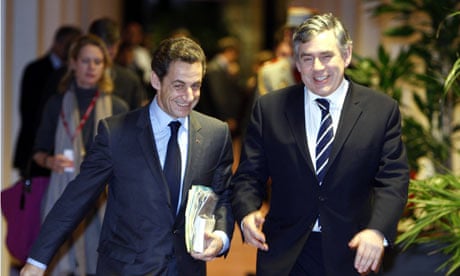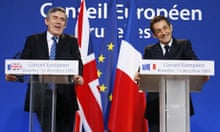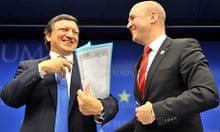A global tax on financial transactions should be used to pay for the long battle against global warming, Gordon Brown and Nicolas Sarkozy said today. The statement came alongside a European Union commitment of €2.4bn a year from January to immediately help the world's poor countries cope with climate change.
The issue of who should pay for halting warming and its impacts has become the most vexed at the UN talks in Copenhagen and the moves made at the EU summit in Brussels are an attempt to break the deadlock.
In a joint statement, the UK prime minister and French president said: "To ensure predictable and additional finance in the medium term to 2020 and beyond, we should make use of innovative financing mechanisms, such as the use of revenues from a global financial transactions tax and the reduction of aviation and maritime emissions and the auctioning of national emissions permits."
The introduction of a transaction - or Tobin - tax has been gaining support as nations seek to prevent a repeat of the global economic crisis. The EU issued a communique stating such a tax should be one of several options that the International Monetary Fund should investigate when it puts forward plans on how the world should respond to the financial crisis. A levy on international aviation and shipping is proposed in some of the negotiating texts being discussed in Copenhagen.
The short-term funding figure, higher than expected, was agreed at an EU summit in Brussels, as part of a broader package that would come from the industrialised countries around the world. This would contribute €7bn a year for the next three years in fast-track funding for developing nations facing increased flooding, droughts and other impacts of global warming.
With financial transfers from rich to poor at the heart of a possible outline deal next week, it remained to be seen whether today's agreement in Brussels would be enough to clinch a pact that could then be turned into a legally binding international treaty within six months.
EU leaders grappled for two days over how to divide up the bill which had been predicted to a total of $2bn .
Britain had offered to supply £800m over the three years, but in the end apparently became Europe's single biggest contributor to the package, pledging £500m pounds a year, or £1.5bn for the fast-track fund.
Brown said comparable contributions would come from France and Germany. Germany, the most powerful economy in the EU, has not given any specific figure, but is expected to pay about 20% of the EU total.
"Our figure is the highest at the moment," he said. "I believe others will contribute more in coming days. I think we've done the right thing. People will be able to say of us, we have done everything" to make a Copenhagen climate change settlement possible, he said. The UN conference in the Danish capital is seeking a pact to cut global carbon emissions and avert dangerous climate change.
The EU also emphasised its willingness to increase its target for cutting greenhouse gases 30% by 2020, compared with 1990 levels, if the rest of the world signs up to a sufficiently ambitious package in Copenhagen. The EU is currently committed to 20% cuts by 2020.
While the fast-track fund agreed was bigger than anticipated, it was unclear where all the money was coming from and whether existing aid budgets would be raided and recycled into climate change money.
Tim Gore, Oxfam's EU climate change policy adviser, said: "EU leaders only offered small sums of short-term cash. Worst of all, this money is not even new – it's made up of a recycling of past promises, and payments that have already been made."
Brown appeared to concede that some of the short-term funding would be diverted from aid and development budgets, but stressed that in the medium-term "we don't want this to be at the expense of our international development goals."
If a deal is reached in Copenhagen, EU leaders reckon that $100bn will need to be transferred annually from the rich to
the poor countries from 2020. But President Barack Obama has told European leaders that he cannot accept the £100bn figure as he would never get it through the US Congress.





Comments (…)
Sign in or create your Guardian account to join the discussion